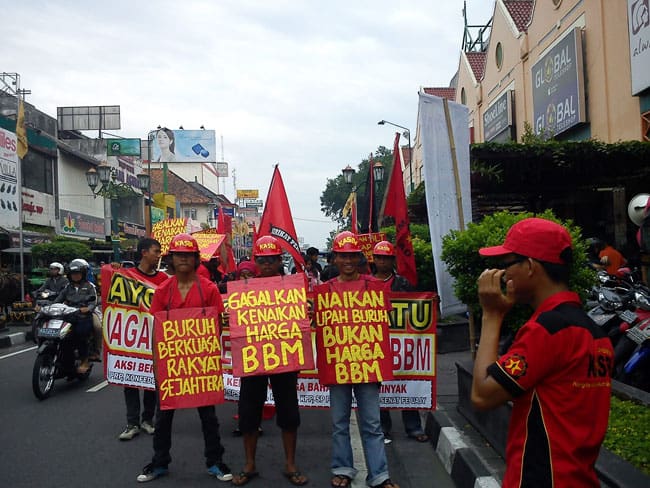
While not quite so common on the island of Bali, anybody that has spent any amount of time in Indonesia knows that riots in the streets of places like Jakarta are all too common of a sight. Problems of a political nature both large and small can cause massive riots on the streets with thousands of locals protesting and expressing their feelings of oppression. The latest cause for protest has been none other than the rising price of gas, scheduled to rise to rp 6,000 per liter from rp 4,500 per liter (a 33% increase) that will begin on April 1st. The road up to the price hike has been rocky and uncertain like most things in Indonesia with the final decision only being agreed upon just before the date when it was set to be carried out. Understanding the price hike though requires understanding of the fuel situation in Indonesia as a whole.
Making sense of subsidized fuel in Indonesia
In order to understand the full situation, one must realize that the government isn’t actually raising the price of gas because the gas is still subsidized for consumers, just a little bit less so. The fuel known as Premium has been subsidized by the government so that the people that are “kurang mampu” or less able can afford to fill up their vehicles allowing themselves to go to work or transport goods involved in their own businesses. Fuel in Indonesia remains much cheaper than other Southeast Asian countries like Thailand where fuel is around twice as much. Indonesia has other higher quality (depending on who you ask) fuels that sell for about the same price as other countries that don’t subsidize their fuel known as Pertamax. In theory the Premium is meant for poorer people and those that can afford it should be using Pertamax. Most people just end up just buying the Premium anyway because of the lower price tag.
But isn’t Indonesia a country that is rich in resources like oil?
Yes, very rich indeed! What Indonesia lacks is the facilities required to refine such crude oils and turn them into a product that can be used to power motor vehicles and other things. So the crude oil sourced in Indonesia is generally shipped out of the country to be refined and then brought back once it is usable. While it could be argued that it may be cheaper for Indonesia to build oil refineries to process their own fuel, it has still not happened and the fuel situation remains the way it is with the oil being exported and then imported again.
So we are still getting the gas at a subsidized rate?
Yes, the new price of rp 6,000 for Premium fuel will still be subsidized by the government just at a lower rate of subsidization. Anyone from locals to expats and tourists will still be able to purchase gas at the new subsidized rate without any problems. Those looking for the Pertamax brand fuel will still be able to find it as well.
I read that the new higher fuel price was only for privately owned cars and that motorbikes would be the same price. What happened?
That was originally the plan although the idea was scrapped. Originally the government proposed for all privately owned cars to be forced to use the more expensive Pertamax fuel, while government vehicles and vehicles used for business, as well as privately owned motorbikes could still use the subsidized premium at the old rate of rp 4,500 per liter. The government ran into problems when they realized how many Pertamina petrol stations did not serve the more expensive Pertamax fuel and they would have to pay to renovate them all to bring them all up to date. It was decided upon that a 33% increase on the price of Premium across the board would be more efficient, at least for the government.
How much will this affect the local and expat communities of Indonesia?
Prices for goods will definitely go up and probably more than they need to. Local businesses tend to use fuel hikes as a reason to raise their prices which is normal and understandable although they tend to raise it too much and end up gaining a profit from it. The cost of living will go up slightly all over Indonesia. Most expats will notice the difference but probably won’t be seriously affected by it. Many locals making meager salaries will notice the increase in prices heavily and will be severely affected by it, hence the riots taking place in Jakarta and Makassar. On the other hand, a high percentage of the people protesting are smokers that spend more on cigarettes everyday than they do on fuel even with the new higher prices. Smoking is almost part of the culture of Indonesia and while it is nobody’s business to tell another person what to do or not to do, it does seem a little silly to get so worked up about something like 16 cent per liter rise in fuel costs when a person spends 10 times that amount on cigarettes every day.
Is it really fair to raise the price of subsidized fuel like this?
Depends on who you ask. Those that are already struggling to feed their families will obviously disagree with the new rates. Those that are doing alright in terms of money might be able to see the government’s side of things as they are losing money to supply their citizens with cheaper gas. While maybe not practical due to having to renovate so many Pertamina stations across the archipelago, in my opinion the idea of charging privately owned cars is a much better idea. Targeting those that are able to own a vehicle privately means only the people who, in theory, have more money to spend will be affected. It might also make people think twice before taking their car out on the road, thus reducing traffic congestion in Jakarta and the increasingly traffic-heavy Bali. That idea has long since been abandoned though so there is no hope for that anymore.
In the end, fuel prices are going to rise and fall just like anywhere else. Fuel prices have already reached rp 6,000 per liter a few years ago in Indonesia before being lowered again by president SBY, presumably in attempt to gain more votes. Life will go on and people will still find a way to feed themselves. The riots and protests will still happen but will stop when people realize that the new law is here to stay. Here’s to hoping the new law that will begin on April 1st is just some elaborate April Fools joke. Something tells me that the Indonesian government just doesn’t have that sort of sense of humor though.

That’s some great info. I’m expat living here in Bali and it’s good to know the background info behind this issue that will affect us all.